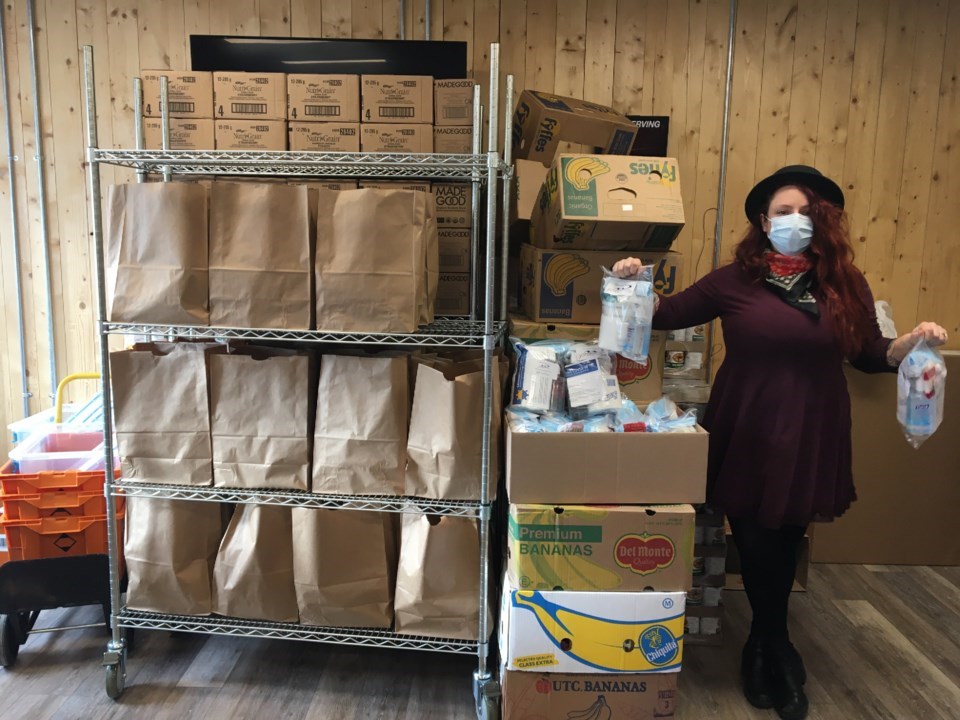For restaurateurs like Priyanka Lewis, the COVID-19 pandemic has been a constant lesson in relinquishing control—not exactly an easy thing to do for the kind of type-A personalities usually drawn to the industry. But in the face of rejigged dining protocols, 11th-hour closures, and the shutdown of Whistler Blackcomb, Lewis wanted to reclaim control in one way she still could: By giving back.
“We’ve been putting out fires and I think for me there was just an a-ha moment where I knew I needed to do something useful,” said Lewis, co-owner of Brickworks Public House and Main Street Noodles. “I can’t control a lot of the stuff that is going on in our industry, but I can control this. I wanted to do something that made a difference to someone else.”
So, with indoor dining suspended until at least May 25 and the resort’s visitation slowed to a trickle, Lewis decided to capitalize on what restaurants do best—feed people—to give back to the community. With support from the Restaurant Association of Whistler (RAW), Lewis is encouraging local restaurants to prepare and donate meals or coupons through the online platform, Meal Train. (Sign up at mealtrain.com/4qegkm.)
“We’re trying to make it as easy and as accessible as possible,” Lewis said, adding that she hopes the initiative will continue on long after the pandemic. “Each restaurant has a choice: you can donate 30 meals from your restaurant, 20 meals, 10 meals, or you can, like with Brickworks, just cook up a batch of something … that can be frozen and then delivered to people in isolation, families in need and people accessing the food bank on the day-to-day.”
Live cookouts are also being organized, with participating restaurants utilizing Alta Bistro’s refurbished 1967 vintage Airstream Bambi trailer to prepare meals onsite at the food bank.
At a time when restaurant owners have seen firsthand the strain the pandemic has put on their staff, the initiative is yet another way to break down the stigma of accessing the food bank in a year when more Whistlerites than ever have experienced food insecurity.
“In the community right now, there is so much stigma around coming to the food bank or not knowing if there is going to be fresh and healthy foods,” explained Gizem Kaya, food security manager with the Whistler Community Services Society (WCSS), which operates the food bank. “Is it going to be the traditional picture we have in our mind of a food bank? No, actually, we will have frozen meals from Brickworks. We’ve been having frozen meals from the Brew Creek Centre, where they grow their own vegetables and cook freshly harvested [ingredients].”
The restaurant association is also raising much-needed funds for the WCSS’ outreach services, targeting $10,000 of the non-profit’s $50,000 goal, another recognition of the impact the pandemic has had on residents.
“I speak to many, many, many business owners and a lot of staff and people are struggling. That’s why the outreach work is so important to me, to raise that money, because I don’t know the long-term effects [of this pandemic],” Lewis said. “I definitely don’t think we can sugar-coat the toll this is placing on people.”
Demand for the food bank has dropped somewhat from the recent spike during Whistler’s third wave, Kaya said, adding that the Nesters Road facility has changed its operating hours. Instead of six days a week, drop-in hours are now from 1:30 to 5 p.m. Monday, Wednesday and Friday, and by appointment on Tuesday, Thursday and Saturday. Food deliveries are also available by calling 604-932-0113.
Kaya stressed that the food bank is open to anyone experiencing food insecurity.
“People think, ‘Oh, am I going to take away resources from someone who needs it more?’ This is one of the messages we want to get out: We have the community support,” she said. “The local restaurants are helping us, the grocery stores are helping us, so nobody should shy away from coming and getting fresh food at no cost. That’s one of the things that I think people really struggle with because they think there are others who need the food bank more—but this year, we all need it.”





